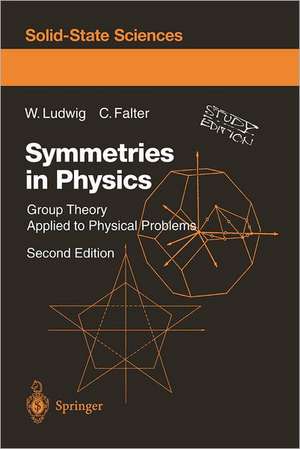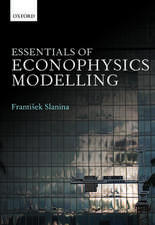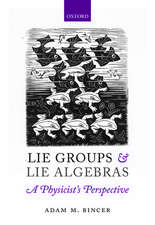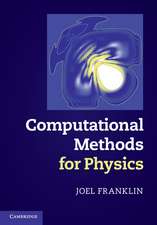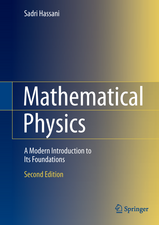Symmetries in Physics: Group Theory Applied to Physical Problems: Springer Series in Solid-State Sciences, cartea 64
Autor Wolfgang Ludwig, Claus Falteren Limba Engleză Paperback – 15 ian 1996
Din seria Springer Series in Solid-State Sciences
- 18%
 Preț: 1225.94 lei
Preț: 1225.94 lei - 18%
 Preț: 1017.62 lei
Preț: 1017.62 lei - 15%
 Preț: 532.05 lei
Preț: 532.05 lei - 18%
 Preț: 944.51 lei
Preț: 944.51 lei -
 Preț: 541.46 lei
Preț: 541.46 lei - 18%
 Preț: 962.35 lei
Preț: 962.35 lei -
 Preț: 385.84 lei
Preț: 385.84 lei - 18%
 Preț: 1827.48 lei
Preț: 1827.48 lei - 15%
 Preț: 661.02 lei
Preț: 661.02 lei -
 Preț: 389.88 lei
Preț: 389.88 lei - 15%
 Preț: 639.59 lei
Preț: 639.59 lei - 15%
 Preț: 635.15 lei
Preț: 635.15 lei - 18%
 Preț: 896.21 lei
Preț: 896.21 lei - 15%
 Preț: 647.92 lei
Preț: 647.92 lei - 15%
 Preț: 651.34 lei
Preț: 651.34 lei - 18%
 Preț: 890.23 lei
Preț: 890.23 lei - 15%
 Preț: 640.55 lei
Preț: 640.55 lei - 15%
 Preț: 649.54 lei
Preț: 649.54 lei - 15%
 Preț: 645.60 lei
Preț: 645.60 lei - 15%
 Preț: 644.30 lei
Preț: 644.30 lei - 15%
 Preț: 653.79 lei
Preț: 653.79 lei - 18%
 Preț: 956.69 lei
Preț: 956.69 lei - 15%
 Preț: 637.59 lei
Preț: 637.59 lei - 23%
 Preț: 1043.41 lei
Preț: 1043.41 lei - 15%
 Preț: 639.08 lei
Preț: 639.08 lei - 15%
 Preț: 648.24 lei
Preț: 648.24 lei - 15%
 Preț: 637.46 lei
Preț: 637.46 lei - 15%
 Preț: 640.06 lei
Preț: 640.06 lei -
 Preț: 391.40 lei
Preț: 391.40 lei -
 Preț: 390.84 lei
Preț: 390.84 lei - 15%
 Preț: 638.57 lei
Preț: 638.57 lei - 18%
 Preț: 1006.06 lei
Preț: 1006.06 lei - 18%
 Preț: 730.79 lei
Preț: 730.79 lei - 15%
 Preț: 640.37 lei
Preț: 640.37 lei - 15%
 Preț: 643.65 lei
Preț: 643.65 lei - 18%
 Preț: 1231.01 lei
Preț: 1231.01 lei - 18%
 Preț: 950.21 lei
Preț: 950.21 lei - 15%
 Preț: 642.68 lei
Preț: 642.68 lei - 15%
 Preț: 640.55 lei
Preț: 640.55 lei - 18%
 Preț: 1229.10 lei
Preț: 1229.10 lei
Preț: 382.95 lei
Nou
Puncte Express: 574
Preț estimativ în valută:
73.29€ • 75.05$ • 60.96£
73.29€ • 75.05$ • 60.96£
Carte tipărită la comandă
Livrare economică 19 martie-02 aprilie
Preluare comenzi: 021 569.72.76
Specificații
ISBN-13: 9783540602842
ISBN-10: 3540602844
Pagini: 492
Ilustrații: XIV, 473 p.
Dimensiuni: 155 x 235 x 26 mm
Greutate: 0.3 kg
Ediția:Softcover reprint of the original 2nd ed. 1996
Editura: Springer Berlin, Heidelberg
Colecția Springer
Seria Springer Series in Solid-State Sciences
Locul publicării:Berlin, Heidelberg, Germany
ISBN-10: 3540602844
Pagini: 492
Ilustrații: XIV, 473 p.
Dimensiuni: 155 x 235 x 26 mm
Greutate: 0.3 kg
Ediția:Softcover reprint of the original 2nd ed. 1996
Editura: Springer Berlin, Heidelberg
Colecția Springer
Seria Springer Series in Solid-State Sciences
Locul publicării:Berlin, Heidelberg, Germany
Public țintă
Lower undergraduateCuprins
1. Introduction.- 2. Elements of the Theory of Finite Groups.- 2.1 Symmetry and Group Concepts: A Basic Example.- 2.2 General Theorems on Group Theory.- 2.3 Conjugacy Classes.- 3. Discrete Symmetry Groups.- 3.1 Point Groups.- 3.2 Colour Groups and Magnetic Groups.- 3.3 Double Groups.- 3.4 Lattices, the Translation Group and Space Group.- 3.5 Permutation Groups.- 3.6 Other Finite Groups.- 4. Representations of Finite Groups.- 4.1 Linear Spaces and Operators.- 4.2 Introduction to the Theory of Representations.- 4.3 Group Algebra.- 4.4 Direct Products.- 5. Irreducible Representations of Special Groups.- 5.1 Point and Double Point Groups.- 5.2 Magnetic Point Groups. Time Reversal.- 5.3 Translation Groups.- 5.4 Permutation Groups.- 5.5 Tensor Representations.- 6. Tensor Operators and Expectation Values.- 6.1 Tensors and Spinors.- 6.2 The Wigner-Eckart Theorem.- 6.3 Eigenvalue Problems.- 6.4 Perturbation Calculus.- 7. Molecular Spectra.- 7.1 Molecular Vibrations.- 7.2 Electron Functions and Spectra.- 7.3 Many-Electron Problems.- 8. Selection Rules and Matrix Elements.- 8.1 Selection Rules of Tensor Operators.- 8.2 The Jahn-Teller Theorem.- 8.3 Radiative Transitions.- 8.4 Crystal Field Theory.- 8.5 Independent Components of Material Tensors.- 9. Representations of Space Groups.- 9.1 Representations of Normal Space Groups.- 9.2 Allowable Irreducible Representations of the Little Group Gk.- 9.3 Projection Operators and Basis Functions.- 9.4 Representations of Magnetic Space Groups.- 10. Excitation Spectra and Selection Rules in Crystals.- 10.1 Spectra — Some General Statements.- 10.2 Lattice Vibrations.- 10.3 Electron Energy Bands.- 10.4 Selection Rules for Interactions in Crystals.- 11. Lie Groups and Lie Algebras.- 11.1 General Foundations.- 11.2 Unitary Representations ofLie Groups.- 11.3 Clebsch-Gordan Coefficients and the Wigner-Eckart.- Theorem.- 11.4 The Cartan-Weyl Basis for Semisimple Lie Algebras.- 12. Representations by Young Diagrams. The Method of Irreducible Tensors.- 13. Applications of the Theory of Continuous Groups.- 13.1 Elementary Particle Spectra.- 13.2 Atomic Spectra.- 13.3 Nuclear Spectra.- 13.4 Dynamical Symmetries of Classical Systems.- 14. Internal Symmetries and Gauge Theories.- 14.1 Internal Symmetries of Fields.- 14.2 Gauge Transformations of the First Kind.- 14.3 Gauge Transformations of the Second Kind.- 14.4 Gauge Theories with Spontaneously Broken Symmetry.- 14.5 Non-Abelian Gauge Theories and Symmetry Breaking.- Appendices.- A. Character Tables.- B. Representations of Generators.- C. Standard Young-Yamanouchi Representations of the Permutation Groups P3 - P5.- D. Continuous Groups.- E. Stars of k and Symmetry of Special k-Vectors.- F. Noether’s Theorem.- G. Space-Time Symmetry.- H. Goldstone’s Theorem.- I. Remarks on 5-fold Symmetry.- J. Supersymmetry.- K. List of Symbols and Abbreviations.- References.- Additional Reading.
Textul de pe ultima copertă
Symmetries in Physics presents the fundamental theories of symmetry, together with many examples of applications taken from several different branches of physics. Emphasis is placed on the theory of group representations and on the powerful method of projection operators. The excercises are intended to stimulate readers to apply the techniques demonstrated in the text.
